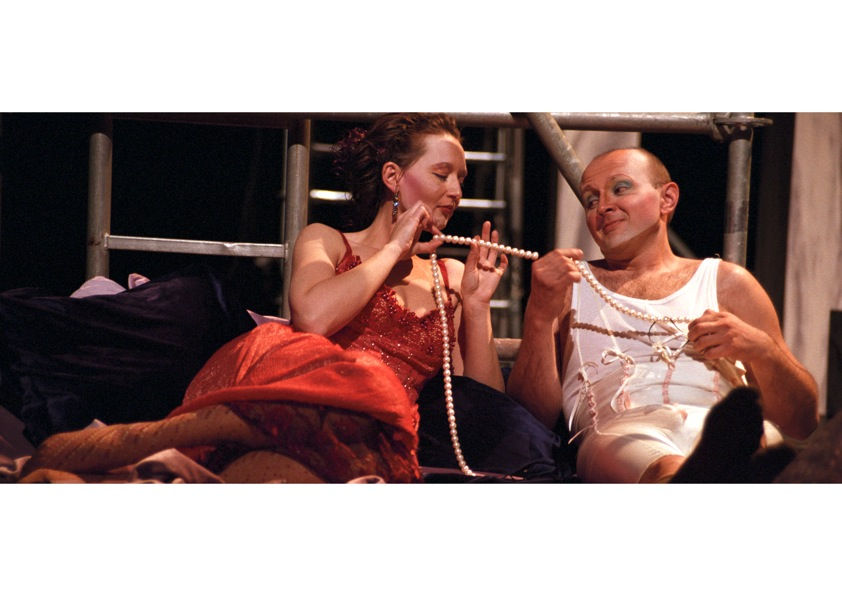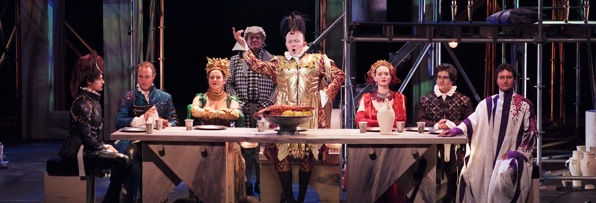Combattimento Consort Amsterdam
Annemarie Kremer
Renate Arends
Michael Hart-Davis
Quirijn de Lang
Piotr Micinski
Clint van der Linde
Robbert Muuse
Jan Alofs
2004
Regie: Eva Buchmann
Kostuums: Peter George d' Angelino Tap
Decorontwerp: Annètje de Jong
Lichtontwerp: Kees van de Lagemaat
Muziek: Georg Friedrich Händel
Photos: Marius Bassi
Agrippina

Agrippina’s libretto, written around 1709 by cardinal Vincenzo Grimani, deals with Tacitus’ Annales and Suetonius’ life of Claudius. With the exception of Lesbo the characters and their mutual affairs have a historic background, even though there are mishaps in the factual chronology of the events. The story is set in Rome at the court of Emperor Claudius, AD 54. The librettist Grimani was in the service of Joseph I and wrote his libretto in times of great hostility between Pope Clemens XI and Emperor Joseph. He probably intended to make a satire on the pontifical court. Agrippina’s intrigues play a central role in this story. Agrippina tries to place her son Nerone on the throne. Since Roman emperors used to be appointed (the imperial title was not determined by heredity), she is forced to operate in an extremely manipulative way in order to achieve her goal. Power is what makes Agrippina tick, with promises of power and eroticism rewarded to the victor of this struggle. A cunning strategy is necessary, every avail- able dirty trick is employed. Gratefully she avails herself of the amoral behaviour of her entourage: with the exception of Ottone everybody is capable of lies, deceit, blackmail, corruption and adultery, as a consequence of which the characters tend to simulate half of the time. According to Agrippina ‘Pretence will get you where you want to be’.
In the course of the opera Agrippina lives through a diversity of emotions. Time and again she believes to have reached her goal, but then it turns out differently, or she becomes the victim of her own pros- pects. Yet she always recovers. Even when every-one turns against her, and Poppea in fact manages to display a similar spirit of combativeness, Agrippina keeps going on and ultimately reaches her goal: Nerone becomes Emperor. The question is, however, is this ‘happy ending’ typical of the 18th century or after all, was the it most meant evil to of leave all an was aftertaste not of even cynicism... punished?
At first the positive outcome may seem unconvincing to the listener, but it is interesting to find out whether it is, in the end, psychologically convincing. Händel’s opera conveys a cer- tain sense of stateliness, especially because of the many da capo arias characteristic of his work. In his lifetime performances were quite different from what they are now. Stages were much smaller, adorned with a number of painted prospects. The characters would come on stage from the wings, from the right or the left, in accordance with the status of the appearing character. Acting was liable to a number of strict rules: actors always used to address the audience, even when coming on stage via the side wings as well as during the dialogues. The standard position - originating in the dance - was not intended to be a true-to-life rendering, but was rather to be characterized by a be spirit of ‘well-being’. Legs and feet, for example, were never to be parallel to one another, and were only to meet in an angle of 90o, with the weight resting on one leg. Many poses can traced Acting basically consisted back of to smoothly the connecting art of all poses painting. together. Moreover, a good many rules originated from the court. Singers often found them- selves at the courts and were therefore acquainted with many of the prevailing rules. Hands were never to hang alongside the body, but were to rest in a number of poses provided for that purpose. The gestures were mainly fixed, on the other hand some gestures were determined according to the different affects. Motion was mainly provided by the recitatives, whereas Opposite the characters during an aria arias would in were order intended often not mainly leave to ‘for the distract the ear’. stage attention.
Furthermore in baroque opera there was this phenomenon called aparte. It concerns pieces of text written in brackets representing the thoughts going on in the mind of a person, and which are not to be heard by the characters, but which are actually interesting to the audience. For that purpose the singers would make a quarter of a turn sideways. The opera Agrippina is teeming with aparte’s because of all that insincerity going on. The characters utter a statement, subsequently revealing their real thought or character in the aparte. It seemed interesting to me to juxtapose the styles of acting in Händel’s time and those of the 21st century for the production of this opera. This means that either one acting style depicts its own reality, thus noble acting for insincerity and realistic acting for everything representing sincere behaviour, but also the range of thought introduced in the aparte’s. Obviously in order to achieve the desirable effect of great contrasts both styles have to be magnified. Realistic acting means immediate acting, pure and natural, with a great sense of familiarity as far as daily reality is concerned; noble acting, however, is the magnified result rules of all the and elegance typical of Händel’s lifetime. As a whole Agrippina should turn out to be a production that fits in with the stately style of Händel’s opera on the one hand, and the performance practice of his time on the other, without losing sight of the liveliness, realism and psychology of contemporary theatre.
"There are those rare, happy moments in a music lover's life when he or she experiences a performance for which superlatives are not enough to describe the feelings that overwhelm him or her. Such a performance took place on Wednesday evening at the Speelhuis in Helmond. Everything was in perfect harmony: the beautiful voices, the magnificent orchestra, the beautiful sets, the colourful costumes and last but not least the fantastic staging by Eva Buchmann."
Eindhovens Dagblad
"The best opera performance in 2004 was Handel's Agrippina, performed by the Combattimento Consort Amsterdam, visiting Zagreb. Authentic musical style with vocal interpretation and thoughtful choreography, thus united, breathes the atmosphere of baroque theatre with modern expression and is an example of a modern opera production with a great dynamic in all its facets."
Glazba Zagreb
"Where conductors and musicians strive for an authentic approach, no director knows how to deal with the barren conventions of baroque theatre. Eva Buchmann has solved the problem here very cleverly. She uses the stylised movements of 18th century theatre where hypocrisy and deceit reign, saving the modern, expressive acting style for themoments when the characters show their true nature."
Haagsche Courant
"Director Eva Buchmann did not look for arbitrary actualising parallels, did not moralise, did not pursue directorial theatre at any price. A playful, light humour and simple theatrical means were enough." (...) "in marked contrast with the cheerful spontaneous playing of the sympathetic and brilliantly chosen soloists. In accordance with beautiful, subtle costumes, with the simple stage design and above all with the excellent musical rehearsal by Jan Willem de Vriend, the audience was introduced in a witty and communicative way to a treasure of baroque opera still unknown in Slovakia."
Kultura
"For director Eva Buchmann, a few props were enough, the simple stage design came alive in the action full of variety, whereby the tension never once slackened in the three hours. Every person was characterised in sharp contours, every situation had its clou, in every moment the action on stage corresponded with the music."
Pravda Bratislava
"Es gibt diese seltenen, glücklichen Momente im Leben eines Musikliebhabers, in denen er oder sie eine Aufführung erlebt, für die Superlative nicht ausreichen, um die Gefühle zu beschreiben, die ihn oder sie überwältigen. Ein solcher Auftritt fand am Mittwochabend im Speelhuis in Helmond statt. Alles war perfekt aufeinander abgestimmt: die schönen Stimmen, das grandiose Orchester, die schönen Bühnenbilder, die farbenfrohen Kostüme und nicht zuletzt die fantastische Inszenierung von Eva Buchmann."
Eindhovens Dagblad
"Alles was in perfecte harmonie: de prachtige stemmen, het grandioze orkest, de prachtige toneelbeelden, de kleurrijke kostuums en niet in de laatste plaats de fantastische enscenering van Eva Buchmann"
Eindhovens Dagblad
"Er zijn van die zeldzame, gelukzalige momenten in het leven van een muziekliefhebber wanneer hij/zij getuige mag zijn van een voorstellingen waarvoor superlatieven te kortschieten om de emoties te beschrijven die hem of haar overvallen. Zo'n uitvoering vond woensdagavond in het Speelhuis in Helmond plaats. Alles was in perfecte harmonie: de prachtige stemmen, het grandioze orkest, de prachtige toneelbeelden, de kleurrijke kostuums en niet in de laatste plaats de fantastische enscenering van Eva Buchmann”
Eindhovens Dagblad
"Die beste Opernvorstellung in 2004 war Händel’s Agrippina, aufgeführt vom Combattimento Consort Amsterdam, zu Gast in Zagreb. Authentischer Musikstil mit vokaler Interpretation und durchdachter Choreografie, so vereint, atmet die Atmosphäre des Barocktheaters mit moderner Expression und ist ein Beispiel einer modernen Opernproduktion mit einer grossen Dynamik in all ihren Facetten."
Glazba Zagreb
25 oktober 2004
"Wo Dirigenten und Musiker eine authentische Annäherung anstreben, da weiß kein Regisseur, wie er mit den kargen Konventionen des barocken Theaters umgehen soll. Eva Buchmann hat das Problem hier sehr schlau gelöst. Die stilisierten Bewegungen des Theaters aus dem 18. Jahrhundert setzt sie dort ein, wo Heuchelei und Betrug herrschen, den modernen, expressiven Schauspielerstil hebt sie sich für dieMomente auf, in denen die Figuren ihre wahre Art zeigen."
Haagsche Courant
30 november 2004
"Regisseurin Eva Buchmann suchte nicht nach willkürlichen aktualisierenden Parallelen, moralisierte nicht, betrieb kein Regietheater um jeden Preis. Ein spielerischer, leichter Humor und einfache theatralische Mittel waren genug.” (...) “im deutlichen Kontrast mit dem fröhlichen spontanen Spiel der sympathischen und brilliant gewählten Solisten. In Übereinstimmung mit schönen, subtilen Kostümen, mit dem schlichten Bühnenbild und vor allem mit der ausgezeichneten musikalischen Einstudierung von Jan Willem de Vriend wurde dem Publikum auf witzige und kommunikative Art ein in Slowakien noch unbekannter Schatz der Barockoper vorgestellt."
Kultura
29 oktober 2004
"Die Regisseurin Eva Buchmann macht sich den Umstand, dass in dieser Oper soviel vorgetäuscht wird, auf interessante Weise zu Nutzen. In musikalischer und theatralischer Hinsicht ist Agrippina ein Aushängeschild, auf das man sehr stolz sein darf."
Leidsche Courant
9 november 2004
Quotes
Ontour
Download
File Name

